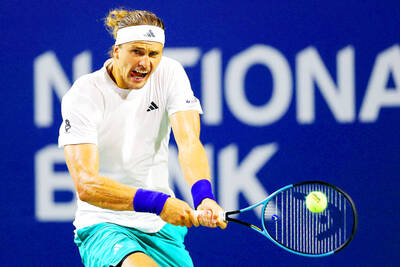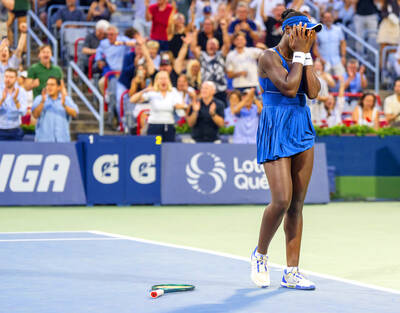Afghanistan batsman Rais Ahmadzai was born, raised and learned to play the game of cricket in a refugee camp in the Pakistani border town of Peshawar.
“We didn’t know our country [then],” Ahmadzai said in an interview. “We felt that Peshawar was our country.”
Now, the 25-year-old who first saw Afghanistan seven years ago is proud to play for his homeland’s national team. And if most Afghans might find soccer more lively and wrestling more traditional, they’re happy to embrace their winning cricket team.
After a series of surprise victories in qualifying tournaments in Jersey, Tanzania and Argentina, Ahmadzai and his teammates are on the verge of the cricket big time. After just eight years of international competition, Afghanistan is among 12 teams playing in South Africa for a place in the 2011 World Cup.
The qualifying tournament in South Africa started yesterday and runs until April 19.
“This two-and-a-half weeks is very important,” Afghanistan bowler Hasti Gul said.
“We are standing at the door of international cricket,” he added, miming a vigorous knock.
When Ahmadzai went to Afghanistan in 2002, he remembers feeling a mixture of freedom at finally leaving the cramped camp in Peshawar and horror at the evidence of war all around — bombed out buildings, maimed men. Afghanistan remains volatile, despite the presence of thousands of foreign troops.
Traveling the world playing cricket, Ahmadzai said he has met people who know nothing about his homeland beyond the headlines about bombings, drugs or the Taliban.
The Afghan players represent another Afghanistan, one that wants to and can be part of the international community. Ahmadzai and his teammates have loped across grassy fields in Europe, Africa and Latin America, playing the elegant game that originated in England and has been embraced around the world.
“We will give a good name, through cricket, to our country,” Ahmadzai said.
After they captured the World Cricket League Division Four trophy in Tanzania last October, their government rewarded the players with a pilgrimage to Mecca. When the team won the World Cricket League Division Three tournament in Argentina in February, they were greeted on their return to the airport in Kabul by a dancing crowd that threw confetti and draped the players in pink and silver garlands — after negotiating concrete security barriers.
“In Afghanistan, people are praying for us,” Gul said. “Afghanistan has had 30 years of fighting. They want a happy moment, celebration.”
Emal Pasarly, deputy chief of the BBC’s Afghan programs, has been covering the team since their early wins. At first, he said, reports were hard to write because, while Afghans who had also been refugees in Pakistan knew something about cricket, most others “don’t know much about the rules. They know winning and losing.”
As the team kept winning and thousands of fan e-mails reached the BBC, Pasarly began to find coaching tips in the messages, evidence Afghans were learning the nuances of the game.
But Afghanistan is an impoverished country and few fans can travel to cheer the team abroad — not that many teams at this level draw crowds.
At a warm-up game against Oman on a community oval in eastern Johannesburg before World Cup qualifying, a handful of Omani spectators cheered their team. One took time out from encouraging murmurs of “well played, boys,” to chat on his mobile phone about a trip to a luxury game park.
No one was in the stands for the Afghans, but the players, crisp in blue and red uniforms, made up for that.
The Afghans are known for being more demonstrative than most.
There were raised arms, hand slaps, shouts of “Shabash” — a phrase in Urdu, picked up like their game in Pakistan, that loosely translates as “Go, team!” Exuberant for cricket, but mild compared to, say, an American football player doing acrobatics in the end zone.
While the Afghans may not have a traveling posse, they do have their own film crew. British journalist Timothy Albone has been making a documentary about the team called Out of the Ashes for a year. He has been fascinated by the team’s Cinderella story since hearing Afghanistan had a cricket team when he was in the country to cover violence from 2005 to 2007.
“With the facilities they’ve got, they shouldn’t be here,” Albone said in an interview. “They’re basically doing it on nothing.”
Albone has seen the team’s bare pitch and one bowling machine in Kabul. As the team began winning and gaining attention, it was adopted by cricket officials in neighboring Pakistan and players practice there more than in Afghanistan these days. Their coach is former Pakistan player Kabir Khan.
It’s not just money the team lacks, but experience. Many of the other teams vying for four World Cup spots in South Africa have played at this level for years, even decades. Some have professional players on their rosters.
But the Afghans have a record of wins. Most of the team grew up playing together in the refugee camp, and they have youth and confidence.
“We are a strong team,” said Khaledaad Noori, one of Ahmadzai’s teammates. “We have good bowling, fielding. In everything, we are perfect.”
And with World Cups played only every four years, they also may have more reason than most to want to win.
“After four years, will we still be alive?” Gul said. “This is our chance.”

TAIWANESE EXITS: Fellow Australian Christopher O’Connell joined Tristan Schoolkate as a winner following his 6-1, 6-2 defeat of Tseng Hsin-chun Australian qualifier Tristan Schoolkate on Monday dispatched rising Brazilian talent Joao Fonseca 7-6 (7/5), 6-4 at the ATP Toronto Masters, ensuring a breakthrough into the world top 100. The 24-year-old from Perth moved to 98th in the ongoing live rankings as he claimed his biggest career victory by knocking out the ATP NextGen champion from November last year. Schoolkate, son of a tennis coach, won his first match over a top-50 opponent on his sixth attempt as he ousted the world No. 49 teenager from Brazil. The qualifier played a quarter-final this month in Los Cabos and won through qualifying for his

Top seeds Alexander Zverev of Germany and American Coco Gauff on Tuesday advanced to the third round of the Canadian Open after both players were pushed hard by their opponents. World No. 3 Zverev, playing in his first match since his first-round loss at Wimbledon, was far from his best, but emerged with a 7-6 (8/6), 6-4 win over Adam Walton under the lights in Toronto. Momentum shifted firmly in Zverev’s favor when he won a 52-shot rally in the first set tiebreak and he sealed the win on a double fault by the Australian in the second set. “It was a very

Canadian teenager Victoria Mboko upset top-seeded Coco Gauff 6-1, 6-4 on Saturday night to reach the National Bank Open quarter-finals. “Your support was incredible,” Mboko told the crowd in French after a chorus of “Ole, Ole, Ole” chants echoed around the venue. “I’m really happy to win today ... It’s incredible. I’m so happy to beat such a great champion.” Gauff dropped to 2-3 since winning the French Open. She followed the major victory with opening losses in Berlin and Wimbledon, then overcame double-fault problems to win two three-set matches in Montreal. Gauff had five double-faults on Saturday after having 23 in

Formula 1 champion Max Verstappen on Thursday said that he is staying with the Red Bull team next year, ending months of speculation over his future. “Some people just like to stir the pot, some people just like to create drama, but, for me, it’s always been quite clear, and also for next year,” the four-time champion said ahead of the Hungarian Grand Prix. “I’m discussing with the team already the plans — the things that we want to change for next year, so that means that I’m also staying with the team for next year,” he said. Verstappen has a contract with